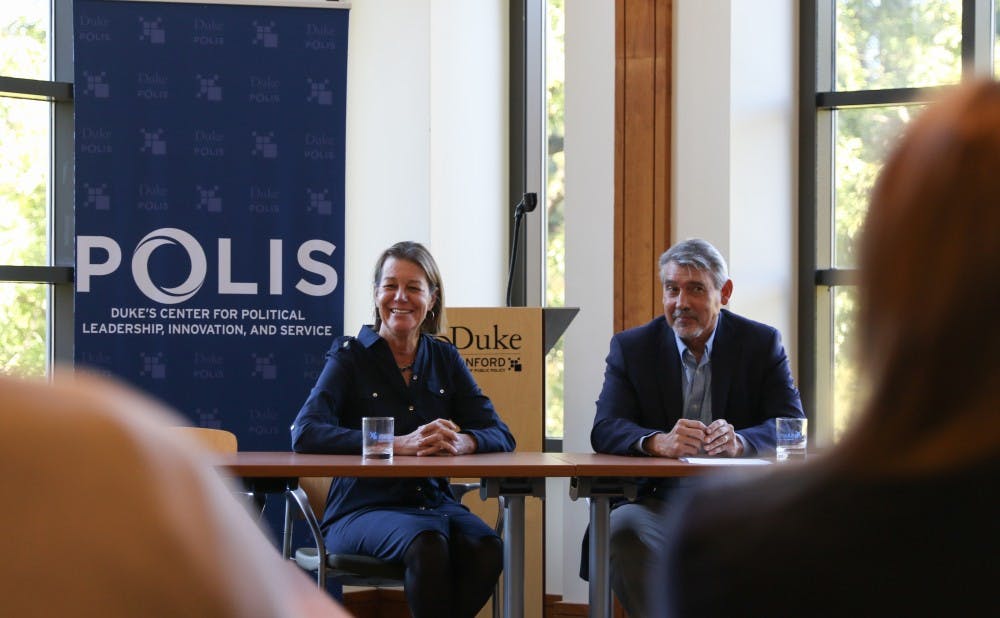Tamera Luzzatto, former chief of staff to Senator Hillary Clinton, emphasized the need for increased bipartisanship and political participation in a talk Monday afternoon.
Sponsored by Duke's Center for Political Leadership, Innovation and Service (POLIS), the event started as Fritz Mayer—professor in the Sanford School of Public Policy—asked the room to observe a moment of silence for the victims of the Tree of Life Synagogue shooting. The two are longtime friends, who lived in the same dorm building at Harvard.
Luzzatto has been interested in public service for a long time. She said she “got the bug” for public service first when she was a teenager in the 60s.
“That was also an era of where there was an enormous amount of energy in civil rights, women’s rights, opposition to the Vietnam war and an awareness of the environmental dangers that were threatening our planet,” Luzzatto said.
She began her political career by organizing her seventh-grade classroom to demand the ability to participate in the March Against the Vietnam War. Her protest was unsuccessful, but her class did receive typewriters to write to their congressional delegation to beg them to oppose the war.
Luzzatto’s commitment to service continued in college when she served as the first female president of the Harvard College Democrats. After graduating, she went to work for ACTION—the federal umbrella agency that handled the Peace Corps and other national service programs at the time.
Sen. John D. Rockefeller gave her a chance to begin work on the Hill as a legislative assistant. She then became his legislative director and ultimately, his chief of staff.
Luzzatto was then-Senator Hillary Clinton’s chief of staff from 2001 until 2009. She offered a glimpse into her role.
“One senator said to me, ‘I think we all thought she would walk in with horns',” Luzzatto recounted.
Luzzatto worked to show the world and her Senate colleagues that Clinton cared deeply about making a lasting, positive impact.
“[Clinton] has been in the business of caring, and acting and doing and even negotiating and crafting and sculpting approaches on how to have an impact on real lives...She really was a workhorse and cared passionately,” Luzzatto said.
Luzzatto talked about the rise of partisanship in our politics and offered possible solutions, commenting that the biggest change in recent politics is that there are very few moderates left. She noted that the primary process is one of the reasons moderates were driven out.
Luzzatto protested the toll that fundraising can have on elected officials who are spending increasing amounts of time raising money rather than building relationships across the aisle and studying and crafting effective policy.
She also lamented the current state of transparency as a result of constant Cable-Satellite Public Affairs Network (C-SPAN) coverage of the Senate floor.
When the U.S. Senate was inside everyone’s home, it took away the ability for senators to have an honest debate about issues, Luzzatto explained. People became reticent to admit they changed their mind on camera.
Students who attended the event took note of the version of the political climate that Luzzatto painted.
“It was interesting to hear her perspective on how the Senate has changed in terms of becoming more partisan. I wonder if the reason is because people aren’t willing to make compromises about their livelihood,” said sophomore Amelia Steinbach.
Luzzatto talked about the huge numbers of women running for office. In her experience, women in office were more open to compromise, passionate about issues such as healthcare and driven by economic issues. She noted that she has seen a huge amount of women be politically energized.
“Trump's win absolutely set them on fire,” Luzzatto said.
Get The Chronicle straight to your inbox
Signup for our weekly newsletter. Cancel at any time.

